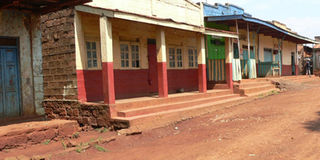Breaking News: At least 10 feared to have drowned in Makueni river
Shopping centre a shadow of its past

Some of the buildings which previously served as shops at Komothai shopping center are now rental houses costing Sh300 a month. An area that previously served as the giant Marige market which is now dead. PHOTO | ERIC WAINAINA
What you need to know:
- In the past, traders from various parts of the county flocked to Marige market to sell farm produce and other wares.
- What used to be shops have been turned into rental houses for people who depend on casual jobs on neighbouring farms. They pay Sh300 in rent per month.
- There is a disused building which residents say housed a cooperative banking organisation that served business people and farmers.
It used to be a busy shopping centre, hosting one of the giant open air markets in the 1990s and even before.
But Komothai shopping centre in Githunguri is today a pale shadow of its former self.
Not much economic and social activity takes place there.
In the past, traders from various parts of the county flocked to Marige market to sell farm produce and other wares.
Residents say if it had survived up to now, it would probably have been bigger than Karatina and Wangige, which are considered busy.
Goats and cows now graze freely on the long grass covering the area where the market once stood.
What used to be shops have been turned into rental houses for people who depend on casual jobs on neighbouring farms. They pay Sh300 in rent per month.
Under normal circumstances, such premises, with at least three rooms and a compound at the back, would see tenants pay Sh6,000 in rent per month.
Mr Joseph Njiru, a coffee farmer, said the market made the centre vibrant. Traders travelled even from far-flung areas during market days, he added.
Very few shops are now operating. To make matters worse, they are not fully stocked.
BANKING INSTITUTION
“The shopping centre used to be popular but when people visit it, they are shocked to find that there is very little activity,” said Mr Njiru.
There is a disused building which residents say housed a cooperative banking organisation that served business people and farmers.
Mr James Njahia said his sister lost Sh300,000 when the institution collapsed. She had deposited the money with the institution barely a week before it closed its doors.
The construction of the Nairobi-Kiambu-Kibichoi road, which passes about a hundred metres away, and the opening of a market at Kwamaiko shopping centre contributed to the fall of Komothai.
Previously, buses picked up and dropped passengers and goods at the Komothai shopping centre. With the new road in place, they stopped.
This prompted traders to flee to Kwamaiko, which is a few kilometres away and located on the Nairobi-Kiambu-Kibicho road.
“The effect was that buyers began to shun Komothai and those who ran big shops started closing them,” said Mr Njahia.





